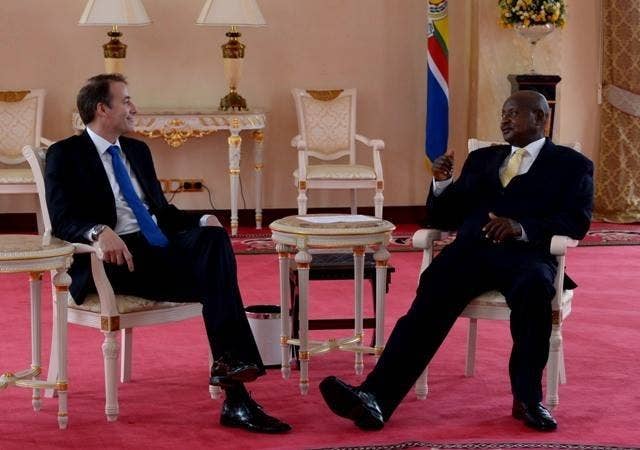
KAMPALA, Uganda — The European Union Ambassador to Uganda, Kristian Schmidt, said his delegation "came very close" to reaching an agreement with the government of Uganda that would mitigate the impact of the Anti-Homosexuality Act in a meeting held last Friday.
During an interview in his office in the Ugandan capital on Wednesday, Schmidt would not specify what assurances the EU sought from the five cabinet officials he met with behind closed doors last week. But, he said, he was "very" satisfied with the conversation and expected to resume the discussion after Ugandan officials returned from a summit between EU leaders and African leaders being held this week in Brussels.
"I am satisfied with the fact that ... there were five ministers [in the meeting] ... ready to give us assurances, that the law wouldn't mean violations of privacy, freedom of expression, freedom of assembly, [and] the way medical care will be extended in facilities that are already caring for men who have sex with men," Schmidt said. And while the EU believes the "law is discriminatory from A to Z and it has to be repealed," he said, "there are ways to limit the damage. I want to keep working on that [through dialogue]."
The European Union and its member states provide an amount equal to about 10% of Uganda's annual budget, chiefly in the areas of good governance, infrastructure, and agriculture. As seriously as the E.U. regards the question of LGBT rights, he said, he rejected the notion that human rights conditions should be attached to international support in Uganda. In extreme cases — such as a coup d'etat — the EU has suspended aid to African countries, he said, but "you wouldn't find any African country where we have done that on the basis of ... an anti-homosexuality bill."
"We do not try to buy African acceptance for European or universal values through our development cooperation," he said. "Because what happens when you try to do that, you get the [backlash] that we're seeing. ... It's not productive to present it as a trade off."
Asked whether he found the word of the ministers credible — especially given that President Yoweri Museveni had assured foreign allies that he would not sign the Anti-Homosexuality Act before reversing himself and enacting it on Feb. 24 — Schmidt said, "Yes."
But, he said, "this time Europe is asking for these [assurances] to be made public." He declined to "set a deadline" for Uganda to outline the actions it is prepared to take to rein in the law, which imposes up to a lifetime sentence for homosexuality and criminalizes advocating LGBT rights. He added that the rally held Monday celebrating the bill's enactment "sends a mixed message" about how serious the government is about preventing it from violating the human rights and interrupting health care for LGBT Ugandans.
Schmidt took issue with comments that President Museveni made during the rally on the importance of foreign aid. Museveni said that Uganda could afford to pay for anti-retroviral treatment for its HIV positive population if foreign donors withdrew their support, and said that evidence of its financial strength could be seen in major road projects it was now undertaking with its own money. That, said Schmidt, is "blatantly false" — in fact, the European Union is a major underwriter of road construction in Uganda.
Ultimately, he said, "it's for the electorate of Uganda to judge the record of the government." And though there is already signs that Museveni is clamping down on opposition in preparation for the 2016 elections — such as the shutdown of opposition rallies last week and the arrest of their leaders — there had been improvement in elections since the restoration of multi-party democracy in 2005.
"Electoral reforms are long overdue," said Schmidt, but "the West also has to be sensitive to the challenges created by introducing multiparty democracy and not think that our democratic model will just sort of work automatically on African soil. We all learned that democracy cannot be exported. We learned that in Afghanistan and Iraq."
